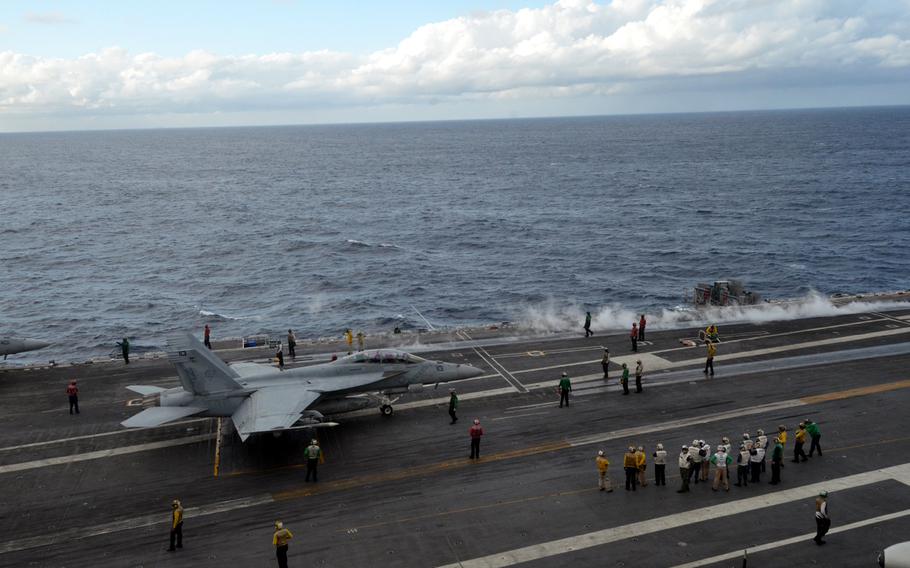
A U.S. Navy F/A-18 Super Hornet prepares for takeoff aboard the USS Ronald Reagan in international waters south of Atsugi, Japan, on Tuesday, Nov. 24, 2015. The flight operations came as Japanese and U.S. forces wrapped up Annual Exercise, a bilateral maritime drill. (Erik Slavin/Stars and Stripes)
ABOARD THE USS RONALD REAGAN — Japan’s forces are capable of conducting operations in the South China Sea alongside the United States if called upon, the commander of the Japan Maritime Self-Defense Force said Tuesday following a bilateral sea exercise.
“We have not been given any specific orders to do something in the South China Sea,” Vice Adm. Yasuhiro Shigeoka, commander of the Japanese Maritime Self-Defense Force, said during a joint news conference with U.S. 7th Fleet commander Vice Adm. Joseph Aucoin. “However, we have been conducting training to coordinate with the U.S. Navy, so we can take such action if orders are given.”
His comments come amid rising tensions between China and other nations over freedom of navigation and territorial claims in the South China Sea, where about $5 trillion in globe trade transits annually.
On the sidelines of the Asia-Pacific Economic Cooperation summit last week, President Barack Obama asked Japan Prime Minister Shinzo Abe to consider multilateral patrols in the disputed waters, according to multiple media reports.
On Sunday, Abe told an Association of Southeast Asian Nations gathering in Kuala Lumpur that he was “seriously concerned” about China’s militarization of artificial islands, which China has created on top of submerged reefs during the past year, according to The Associated Press. Abe added that Japan had no current plans to join the U.S. on “freedom of navigation” exercises in the South China Sea, however he did not rule out future operations.
China maintains that the sea and its hundreds of rocks, reefs and islands are its “indisputable territory,” as are the Japan-administered Senkaku Islands in the East China Sea. The U.S., Japan and other allies have stated that China’s attempts at regulating the global commons don’t follow international maritime law.
The U.S. military is sworn to defend Senkaku and other Japanese territory under a defense treaty, and it regularly holds complex exercises with Japan’s forces. On Tuesday, it undertook some of the final phases of Annual Exercise, in which the U.S. has participated since 1982, according to Shigeoka.
U.S. ships transferred food and other supplies to Japanese ships at sea for the first time, Aucoin said. If Japan begins undertaking more maritime patrols farther from its shores — something that recently passed security legislation gives Japan more leeway to do — extending logistical lines would be an important step.
Besides the supply operations, Japanese ships and aircraft drilled with U.S. surface ships, aircraft and a submarine on a variety of combat scenarios during the exercise, which began Nov. 16, Navy officials said.
Aucoin praised the current U.S.-Japan maritime relationship as key to stability in the region, and left room for it to grow.
“In the future, I do think I could see where we are tighter as far as operations, but I leave it to JMSDF how integrated they want to make this,” Aucoin said.
Twitter: @eslavin_stripes